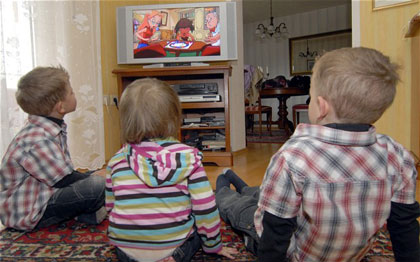When it comes to television and children: limiting screen time, teaching good TV habits may both be parental controls that are long overdue. Most kids plug into the world of television long before they enter school. According to the Kaiser Family Foundation (KFF):
- Two-thirds of infants and toddlers watch a screen an average of 2 hours a day
- Kids under age 6 watch an average of about 2 hours of screen media a day, primarily TV and videos or DVDs
- Kids and teens 8 to 18 years spend nearly 4 hours a day in front of a TV screen and almost 2 additional hours on the computer (outside of schoolwork) and playing video games
The American Academy of Pediatrics (AAP) recommends that kids under 2 years old not watch any TV and that those older than 2 watch no more than 1 to 2 hours a day of quality programming.
This article is written by Janet Cater
The first 2 years of life are considered a critical time for brain development. TV and other electronic media can get in the way of exploring, playing, and interacting with parents and others, which encourages learning and healthy physical and social development. As kids get older, too much screen time can interfere with activities such as being physically active, reading, doing homework, playing with friends, and spending time with family. Kids who view violent acts are more likely to show aggressive behavior but also fear that the world is scary and that something bad will happen to them. TV characters often depict risky behaviors, such as smoking and drinking, and also reinforce gender-role and racial stereotypes. That’s why it’s so important for you to monitor the content of TV programming and set viewing limits to ensure that your kids don’t spend too much time watching TV.
TV violence and children
To give you perspective on just how much violence kids see on TV, consider this: The average American child will witness 200,000 violent acts on television by age 18. Kids may become desensitized to violence and more aggressive. TV violence sometimes begs for imitation because violence is often promoted as a fun and effective way to get what you want. Many violent acts are perpetrated by the “good guys,” whom kids have been taught to emulate. Even though kids are taught by their parents that it’s not right to hit, television says it’s OK to bite, hit, or kick if you’re the good guy. This can lead to confusion when kids try to understand the difference between right and wrong. And even the “bad guys” on TV aren’t always held responsible or punished for their actions.
Young kids are particularly frightened by scary and violent images. Simply telling kids that those images aren’t real won’t console them, because they can’t yet distinguish between fantasy and reality. Behavior problems, nightmares and difficulty sleeping may be a consequence of exposure to media violence. Older kids can also be frightened by violent depictions, whether those images appear on fictional shows, the news, or reality-based shows. Reasoning with kids this age will help them, so it’s important to provide reassuring and honest information to help ease fears. However, consider not letting your kids view programs that they may find frightening.
Television and Children: Limiting screen time, teaching good TV habits may help with obesity
Health experts have long linked excessive TV-watching to obesity — a significant health problem today. While watching TV, kids are inactive and tend to snack. They’re also bombarded with ads that encourage them to eat unhealthy foods such as potato chips and empty-calorie soft drinks that often become preferred snack foods.

Commercials
According to the AAP, kids in the United States see 40,000 commercials each year.
From the junk food and toy advertisements during Saturday morning cartoons to the appealing promos on the backs of cereal boxes, marketing messages inundate kids of all ages.
And to them, everything looks ideal — like something they simply have to have.
It all sounds so appealing — often, so much better than it really is.
Under the age of 8 years, most kids don’t understand that commercials are for selling a product. Children 6 years and under are unable to distinguish program content from commercials, especially if their favorite character is promoting the product. Even older kids may need to be reminded of the purpose of advertising.
Have your kids watch public television stations (some programs are sponsored — or “brought to you” — by various companies, although the products they sell are rarely shown).
Teaching Good TV Habits
Here are some practical ways to make TV-viewing more productive in your home:
- Record programs — without the commercials.
- Buy or rent children’s videos or DVDs
- Limit the number of TV-watching hours
- Stock the room in which you have your TV with plenty of other non-screen entertainment (books, kids’ magazines, toys, puzzles, board games, etc.) to encourage kids to do something other than watch the tube
- Keep TVs out of bedrooms
- Turn the TV off during meals
- Treat TV as a privilege to be earned — not a right
- Try a weekday ban. Set a good example by limiting your own TV viewing
- Check the TV listings and program reviews ahead of time
- Preview programs before your kids watch them
- Come up with a family TV schedule that you all agree upon each week. Then, post the schedule in a visible area (e.g., on the refrigerator) so that everyone knows which programs are OK to watch and when. And make sure to turn off the TV when the “scheduled” program is over instead of channel surfing
- Watch TV together. If you can’t sit through the whole program, at least watch the first few minutes to assess the tone and appropriateness, then check in throughout the show
- Talk to kids about what they see on TV and share your own beliefs and values. If something you don’t approve of appears on the screen, you can turn off the TV, then use the opportunity to ask thought-provoking questions such as, “Do you think it was OK when those men got in that fight? What else could they have done? What would you have done?” Or, “What do you think about how those teenagers were acting at that party? Do you think what they were doing was wrong?” If certain people or characters are mistreated or discriminated against, talk about why it’s important to treat everyone fairly, despite their differences. You can use TV to explain confusing situations and express your feelings about difficult topics (sex, love, drugs, alcohol, smoking, work, behavior, family life).
Finally, parents may find it interesting that the Steiner community discourage the watching of television. Here is some of their reasoning: “In the case of creativity, is argued that television viewing occurs at the expense of other leisure activities such as reading, imaginative play, ‘rest time.’ Children that exhibit a great deal of imagination in their play are better able to concentrate, develop greater empathic ability, and are better able to consider a subject from different angles. (Singer & Singer 1990).
Action-orientated and violent programs have an arousing quality and can foster a physically active and impulsive behavior orientation in children, which in turn disturbs the sequential thought and planning necessary for organizing plots of make-believe games and creative tasks.
Such programs can also lead to restlessness, and impulsivity at school and lack of WILL.”
Janet Cater is the author of “Why Won’t My Child Listen?”
- Vitamin D – “The Sunshine Vitamin” - 29/06/2022
- 20 Tips to Control Your Sugar Cravings - 06/10/2021
- Knock out that cold or flu and fast track your way back to health! - 15/06/2021




Leave a Reply